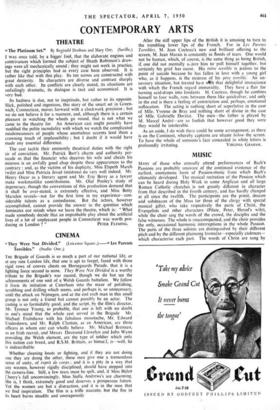CONTEMPORARY ARTS
THEATRE
The Platinum Set." By Reginald Denham and Mary Orr. (Saville.) I WAS once told, by a bigger fool, that the elaborate engines and contrivances which formed the subject of Heath Robinson's draw- ings were all mechanically sound ; they might not work in practice, but the right principles had in every case been observed. It is rather like that with this play. Its ten scenes are constructed with great dexterity. Its characters are diverse and contrast sharply with each other. Its conflicts are clearly stated, its situations are unfailingly dramatic, its dialogue is taut and economical. It is very bad.
Its badness is due, not to ineptitude, but rather to its opposite. Slick, polished and ingenious, this story of the smart set in Green- wich, Connecticut, moves forward with a clockwork precision ; but we do not believe it for a moment, and, although there is a certain pleasure in watching .the wheels go round, that is not what we came to the theatre for. An American cast might possibly have modified the polite incredulity with which we watch the complicated misdemeanours of people whose anomalous accents lend them a crowning touch of implausibility ; but I doubt if it would have made any essential difference.
The cast tackle their eminently theatrical duties with the right air of conviction. Mr. Patrick Barr's charm and authority per- suade us that the financier who deceives his wife and cheats his mistress is an awfully good chap despite these appearances to the contrary ; and, as the victims of his duplicity, Miss Elspeth March (wife) and Miss Patricia Jessel (mistress) do very well indeed. Mr. Henry Oscar as a literary agent and Mr. Eric Berry as a lawyer make workmanlike contributions. Mr. Olaf Pooley's study of degeneracy, though the conventions of this production demand that it shall be over-stated, is extremely effective, and Miss Betty Marsden reveals—not for the first time in my experience—con- siderable talents as a comedienne. But the actors, however accomplished, cannot provide the answer to the question which iominates our minds when we leave the theatre, which is: "What made somebody decide that an improbable play about the artificial lives of a lot of unpleasant people in Connecticut was worth pro-






































 Previous page
Previous page